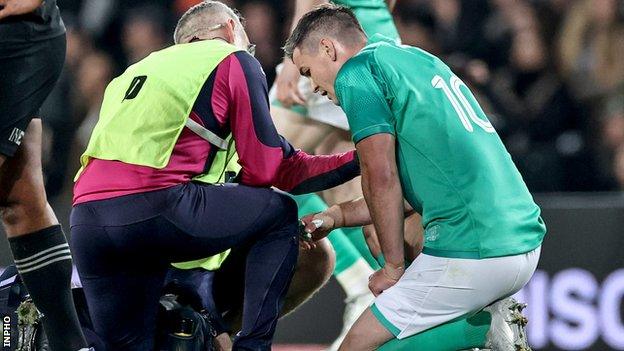Johnny Sexton: Ireland hopeful captain could make second All Blacks Test despite head injury
- Published

Johnny Sexton came off after 31 minutes at Eden Park and did not return to the action
Ireland hope Johnny Sexton can play in next weekend's second Test against New Zealand despite coming off with a head injury in their series opener.
The captain went off for a head injury assessment (HIA) after 31 minutes of Saturday's 42-19 defeat in Auckland.
Fly-half Sexton did not return for the second half.
But head coach Andy Farrell said Sexton was in contention for next Saturday's Test in Dunedin, having passed the second stage of HIA protocol.
Farrell was asked after the game why his captain had not returned to the pitch if he had passed the second stage (HIA 2).
"Because they tested him and deemed him not fit to go on because there's all different sort of tests that go on," he explained.
"You can stumble in your studs, you know, and not go off."
Players who suffer head injuries must go through a three-stage HIA protocol, the third of which is conducted between 36-48 hours after the incident in order to identify a late diagnosis of concussion.
World Rugby recently introduced a new ruling that means players diagnosed with concussion face a minimum of 12 days out of action.
"But Johnny is fine in there," Farrell said after Saturday's defeat.
"HIA 2 is passed, HIA 3 will hopefully be passed in a few days. If that happens, it's concussion not confirmed."
Ireland go into next Saturday's second Test knowing they must beat the All Blacks in New Zealand for the first time if they are to maintain their chances of winning the three-match series.
Despite a promising start at Eden Park, Ireland were overwhelmed by the hosts who scored four tries in 17 first-half minutes to seize complete control of the contest, allowing them to hold the Irish at arm's length in a more even second half.
Ireland did enjoy some bright attacking moments and scored three tries, but were thwarted on multiple occasions by a brilliant All Blacks defence who snuffed out several try-scoring opportunities.
Joey Carbery and Josh van der Flier both thought they had scored second half tries only for the television match official to chalk them off.
"I think we deserve a little pat on the back for that, for getting at least five opportunities to score," Farrell reflected.
"Obviously we'll have a look at reasons why we actually didn't convert but there was a few held up, wasn't there?
"A few that were deemed short or whatever. And a knock-on, or a fumble, the grounding wasn't right on Joey [Carbery], apparently. I've seen them given before but anyway, that's a different story.
Rieko Ioane's outstanding last-gasp defending denied Joey Carbery a certain try
"I thought we created quite a bit actually but ultimately, like I said before the game, you've got to score points against the All Blacks. There's no doubt about that."
Keith Earls' sixth-minute try was just reward for Ireland's fast start, and suggested that Farrell's side had the ability to run New Zealand close at a stadium where the hosts have not lost since 1994.
However, things quickly turned sour for the visitors as New Zealand capitalised on Irish mistakes to go into the interval with a 23-point lead.
"That's what they do to you, isn't it?" Farrell said.
"You can be attacking lovely and think that you're flowing pretty well and all of a sudden, you take your eye off the ball for one second and there's an intercept if you're not quite accurate enough or quick enough or aggressive enough at the wide breakdown."
Meanwhile, centre Stuart McCloskey is on his way out to New Zealand to link up with the squad in place of Ulster team-mate James Hume, who suffered a tour-ending groin injury against the Maori All Blacks on Wednesday.
He is Ireland's third late call-up after prop Ed Byrne and Munster hooker Niall Scannell were called into the side.